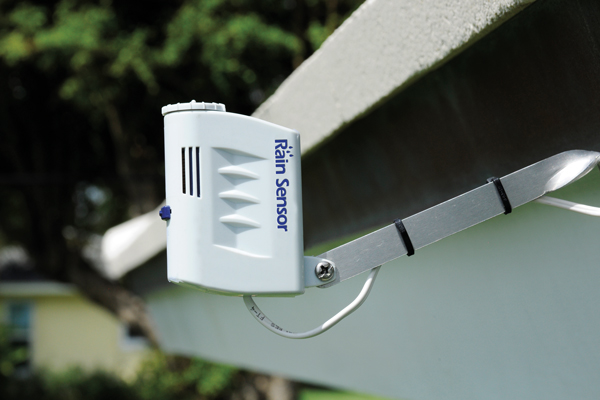
Most people have seen an irrigation system running while it’s raining and thought about how wasteful it is. Or worse, they’ve witnessed a system running when temps are near freezing and could cause plant damage or injury.
Rain/freeze sensors not only help professionals avoid calls complaining about the above scenarios, but these devices also can position irrigation professionals as experts who care about helping customers use less water, according to Joe Porrazzo, marketing group manager of controllers and wireless products with Rain Bird.
“I believe rain/freeze sensors can be utilized to ensure trust between professional landscapers and their customers,” he says. “These products are fairly inexpensive and easy to install, so they’re a low-cost investment that provides valuable peace of mind.”
Learn more about how professionals can use rain/freeze sensors to have a leg up on the competition.
Part of the sale
Rain/freeze sensors provide the purest form of on-site accuracy for rainfall detection, Porrazzo says. With the increasing adoption of Wi-Fi-enabled products that also use localized weather, on-site sensors are ideal for customers who prioritize accuracy and response time.
In his experience, the most successful contractors provide a rain sensor — either wired or wireless — as an assumed sale on each installation they quote.
“Providing customers with a good/better/best option where a rain sensor is included as the ‘best’ option has also been successful,” Porrazzo says.
Wired rain sensors can be affordable and often don’t impact the overall cost of an irrigation system installation, he adds. Prices range from $30 for a rain sensor to $105 for a rain/freeze sensor.

Site-specific approach
These sensors help prevent overwatering and avoid damage when the temperature approaches freezing levels, says Rick Hall, market development director for K-Rain.
“Irrigation systems are programmed to deliver exactly the amount of water needed based on the landscape its watering needs,” Hall says. “When rainfall is plentiful, the sensor prevents system operation. A knowledgeable professional will program a system correctly knowing that all rainfall is productive.”
In addition to sharing how the sensors conserve, professionals should incorporate site-specific components in proposals to fully convey the benefits. That includes soil infiltration rates, grade changes and full-sun exposure.
Savings benefit
It’s important to note that many municipalities require rain sensors, says James Bick, associate product manager for Hunter Industries.
“This saves water and prevents additional runoff or soaking that might occur during simultaneous rain and irrigation,” he says.
Freeze sensors work the same way, but only when the air temperature is very near freezing. The additional benefit is that freeze sensors can prevent irrigated areas from becoming icy. Professionals should position rain/freeze sensors to be fully exposed to the sky — not under an overhang, gutter or tree canopy.
Talking with clients about how they feel when they see an irrigation system running while it’s raining is a good starting point for selling these devices, experts say.


